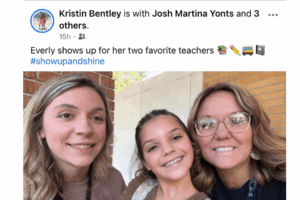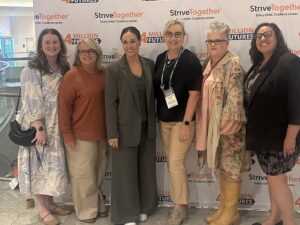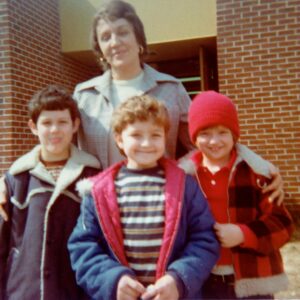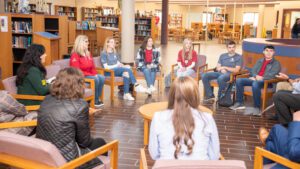
Rosie Stafford
Project Manager, AppC2C
Decades ago, when I first started this work, I sat in a conference in Washington, D.C., in awe of Geoffrey Canada. If you don’t know who he is—run, don’t walk, to check him out. His Cradle to Career work in Harlem inspired me to believe that I, too, could create real change for kids and families. If he could transform a 97-block area of Harlem to improve the lives of its residents, why couldn’t I make an impact in my own corner of the world?
One of his most powerful messages was about high expectations—kids often live up to what we expect of them. He also emphasized the systemic change needed to improve outcomes for all students, and he was right. Empowering families and youth is the best way to make that change. His words have stayed with me over the years as a roadmap for what’s possible.
Cradle to Career: A Community-Driven Approach
The concept of Cradle to Career means supporting every step of a child’s development—from birth through adulthood and employment. The beauty of this work is that there is no one-size-fits-all approach. Every community has unique challenges, but each also has protective factors that can drive improvement.
At Appalachian Cradle to Career Partnership (APPC2C), we are working smarter, not harder. Many of us share the same mission, so why not collaborate? That’s why we’ve launched three Strategic Work Groups to tackle key challenges together:
- Child Care & Early Childhood Programming
- Youth Mental Health
- Paid Work Experiences for Youth
Each group brings together business leaders, nonprofit professionals, civic leaders, educators, mental health experts, parents, and youth to create solutions that will shape the future of our region.
Child Care & Early Childhood Programming
Access to quality, affordable child care is a game-changer. For parents, it means the ability to work, pursue education, and provide for their families. For children, it means better preparation for kindergarten and long-term academic success.
But the reality in our region is stark—there are not enough child care options, especially for infants through age four. Many of the counties we serve have little to no infant care, creating a massive gap between available child care spots and the number of children who need them.
This work group is committed to changing the landscape of child care in Appalachia, ensuring that more families have access to the support they need to thrive.
Youth Mental Health: Addressing a Growing Crisis
Youth mental health is deeply connected to everything we do. Chronic absenteeism is often linked to anxiety and depression. A 2024 Youth Trust Survey of 500,000 students found that 48% reported struggling with mental health challenges that make it difficult to perform in school—up from 39% in 2020 (Mental Health America).
There’s no single cause for this increase. The opioid epidemic, social media, the lasting effects of COVID-19, increased awareness of mental health disorders, and a lack of services all play a role.
This work group is developing a plan to better support youth—with youth voices at the table. By listening to them, we’ll gain a clearer picture of their needs and create solutions that truly help.
Paid Work Experiences: A Stronger Workforce Pipeline
Internships and paid work experiences are critical in the Cradle-to-Career pipeline. We must ensure that youth are prepared for the jobs of the future.
Our Paid Work Experiences work group is focused on expanding opportunities across the 54-county Appalachian Regional Commission footprint. We’ve brought together higher education institutions, employers, and workforce development programs to build a stronger talent pipeline.
The National Association of Colleges and Employers (NACE) reports that, on average:
- 72% of companies offer full-time jobs to interns
- 80% of those interns accept those jobs
- Overall, 58% of interns transition into full-time employment (Forbes).
By giving students real-world experience and connecting them with high-quality job opportunities, we’re not just improving their futures—we’re strengthening the communities where they live and work.
A Collective Vision for Change
Geoffrey Canada’s message remains as relevant as ever: No child should be left behind because of circumstances beyond their control. His work proves that when communities, families, and educators work together, we can create the conditions necessary for every child to thrive—not just survive.
Through APPC2C and our Cradle-to-Career initiatives, we are changing the course of history—one child, one family, and one community at a time.


An Opportunity to Invest in Your Child: Understanding Trump Accounts
Building Long-Term Financial Security for Millions of Children: Tax-Advantaged Investment Accounts Coming in 2026 Beginning in 2026, a new and innovative program known as Trump

Showing Up Together: Stories of Attendance in Action
When September began, I asked a simple question: “Why be at school?” Over the past few weeks, I’ve seen that question answered in classrooms, homes,

The Power of Striving Together
Last week I had the opportunity to attend my first StriveTogether Cradle to Career Network Convening. On my flight to Atlanta, I kept thinking about

One of 15: Rosie Stafford Earns Prestigious GPC Certification
We are thrilled to share that our Program Manager, Rose-Linda “Rosie” Stafford, has joined an elite group of just 15 professionals in Kentucky to earn

Why Be at School? Because the Future Is Built One Day at a Time
As National Attendance Awareness Month begins, I think back on 30 years in education—and it’s not the ceremonies or milestones I remember most, but the

Rural AmeriCorps: Building Communities from the Inside Out
— Dreama Gentry, President and CEO, Partners for Rural Impact AmeriCorps is often framed as an urban program, where young people travel to unfamiliar cities
